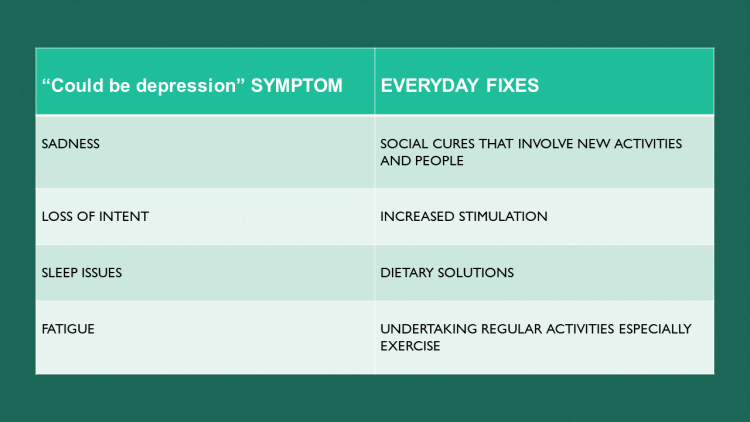
Anxiety and depression are usually linked together in population statistics but although they may sometimes be found together and some people may suffer from both conditions at the same time, it’s likely that they have different underlying causes.
Depression
The term depression does not refer to those occasional bad periods we all go through where we have a normal response of feeling dejected or extremely disappointed because of an undesired occurrence or outcome. Depression should also not be confused with boredom or lack of stimulation although some of the symptoms are quite similar. Most countries of the world report statistics of about a 6% incidence of medically diagnosed depression but this is probably a gross underestimation of the rate of depression.
Depression is rarely defined but is described by the presence of one or more of symptoms that are listed below. However, before concluding the problem is (clinical) depression, I think it’s important to consider whether the feeling might be justified and whether the issue could be changed by a modification of lifestyle? The following list comprises symptoms that could be depression or normal reactions to your current circumstances.
- Persistent feeling of sadness: – Is there a reason for your sadness? Are you lonely? Could you join a social group or have a pet?
- Loss of interest in activities you previously enjoyed: – Are you bored? Do you just need a ‘change of scenery’ or a new source of stimulation?
- Changes in appetite (weight loss or gain): – This could have many causes and a general medical check is probably indicated.
- Trouble sleeping or sleeping too much: – Check your sleeping conditions and routines and look at serotonin (below). It’s also worth trying the effects of eating different foods at different times of the day. A glass of milk before bed may help you sleep because it is high in tryptophan (see below) but for different reasons, high GI food like white rice will also help you sleep. Unfortunately, eating rice or a similar food in the evening could also cause you to gain weight, but a modest serving may be a good solution to your sleep problem.
- Loss of energy or increased fatigue: – This could be caused by an illness and should be investigated but fatigue can often result from a period of reduced activity. Establishing a regular exercise routine is essential to good health and you should try to exercise to your own maximum (or near maximum) ability.

Some other symptoms that are often listed and may be symptoms of more serious depression or other mental illness are:
- Slowed movements and speech; Increase time spent in purposeless tasks
- Feeling guilty or worthless; Difficulty thinking or concentrating
- Decreased confidence and self esteem
- Negative, bleak, or pessimistic attitude
- Self-harmful or suicidal thoughts and/or actions
- Anger
- Confusion, sadness, or hopelessness
- Unexplained body aches and pains
Thyroid Disease and Depression
An underactive thyroid gland can cause depression and mild to severe fatigue. This condition (sometimes autoimmune Hashimoto’s disease) is also usually associated with weight gain, increased sensitivity to hot or cold, bowel changes and menstrual cycle irregularities in females. This contrasts with an overactive thyroid that causes unusual nervousness, restlessness, anxiety, and irritability.
If you are experiencing this group of symptoms, and especially if you have a family history of Hashimoto’s or other autoimmune diseases, do see your doctor immediately.
An underactive thyroid is often caused by lack of dietary Iodine. In the 1970’s and 1980’s an Adelaide doctor, Basil Hetzel found that endemic goiter and cretinism in Papua New Guinea was caused by Iodine deficiency. He was largely responsible for introducing Iodine to salt to overcome the international problem of Iodine deficiency. These days, however, we are discouraged from eating salt and most diets (except perhaps in Japan where Iodine is obtained from eating seaweed) are deficient in Iodine. Since Iodine has now been demonstrated to play many important biochemical roles as well as its critical role in the thyroid, you might consider speaking to a nutritionist about some form of supplementation. You might find that you feel much happier!

Vitamin D, Tryptophan and Depression
In recent blogs I’ve referred to the worldwide deficiencies in Vitamin D that are largely caused by migration, changes in lifestyle, especially much more time spent indoors and over-zealous sun avoidance to avoid skin cancer. I have also referred to the range of health problems that have resulted from this deficiency but especially the reduction in immunity. Here I want to talk about yet another role of vitamin D in preventing Depression. Several recently published studies have shown convincing evidence that supplementation with Vitamin D reduces depression.
Vitamin D doesn’t affect mood directly – despite the positive effects of sunshine – but Vitamin D is an important regulator of the conversion of an amino acid called tryptophan into serotonin and melatonin. Melatonin is important in regulating your sleep-awake daily cycle while serotonin is your mood-regulating ‘happiness’ hormone.
Milk is the best source of the amino acid TRYPTOPHAN, but tryptophan can also be obtained from eating leafy greens, broccoli, peas, mushrooms, sunflower and pumpkin seeds, soybeans, and watercress. But the important new information is that vitamin D plays an important role in the chemical conversion of tryptophan to serotonin and plays several different roles in maintaining optimal serotonin levels.

So, as I have advised before, most modern lifestyles do not give us enough exposure to sunlight to create sufficient Vitamin D and we either need to eat large amounts of fatty fish and/or seaweed or supplement with Vitamin D capsules.
This message is important for people of all ages but perhaps especially the elderly.

Most Interesting ,and complex, topic. Thank you for the good advice about Vit. D. The fact it is now being suggested to help with Covid recovery shows how important it is , especially right now.